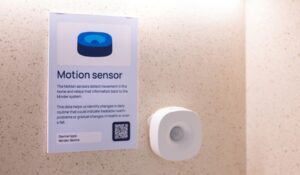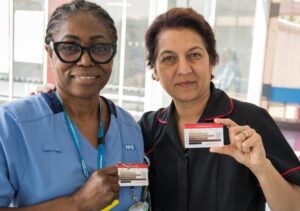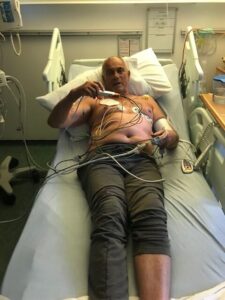Sickness to prevention
The 10 Year Health Plan aims to shift from a system focused on treating sickness to one that prioritises prevention, encouraging healthier lifestyles and early intervention. This involves making healthy choices easier, reaching patients earlier, and maximising opportunities to improve health during patient interactions.
Explore how this transformation is already taking shape across our region.
Hundreds of patients in East London are set to benefit as the NHS opened its first 24/7 neighbourhood mental health centre – a key commitment under the 10 Year Health Plan – offering walk-in support for people with mental illness.
Tower Hamlets in East London is the first community to benefit as the NHS launches this trailblazing model of round-the-clock mental health support which will bring together a range of community mental health services under one roof, including crisis services, community mental health services and short-stay beds.
People with serious mental illness such as schizophrenia or bipolar will be able to walk in without an appointment if they need mental health support, as well as advice on employment, housing, or volunteering. Walk-ins are available from 8am-8pm Monday to Sunday.
The centre will be in the heart of communities and staffed by a team that includes psychiatrists, mental health professionals, peer support workers, and voluntary sector staff.
Patients will also benefit from having local authority, voluntary, faith and community sector organisations onsite at the centres, as well as people with lived experience offering support.
The new initiative is part of a wider effort to make sure mental health care is available when and where it’s needed, including the roll out of 24/7 psychiatric teams in every A&E and the world’s first 24/7 mental health crisis helplines across England, and dedicated mental health emergency departments for those in crisis.
 Imperial College Healthcare NHS Trust has launched a new NHS service for people living with dementia, offering remote, at-home monitoring that provides specialist support. It is hoped the service can lead to more appropriate interventions and earlier treatments for some of the most vulnerable people living in the community.
Imperial College Healthcare NHS Trust has launched a new NHS service for people living with dementia, offering remote, at-home monitoring that provides specialist support. It is hoped the service can lead to more appropriate interventions and earlier treatments for some of the most vulnerable people living in the community.
MinderCare uses a network of sensors installed in the home to send data back to a dedicated team of doctors, nurses and other clinical specialists. This team use the information to better understand how the person is managing their daily routine, provide tailored advice and identify early signs of changing health and care needs which may help reduce unnecessary hospital admissions.
Read more on the Imperial College Healthcare NHS Trust website.
A trust nurse at London North West University Healthcare is the first in the world to highlight the importance of using a skin tone card to spot the early warning signs of pressure ulcers and other skin damage among black and Asian patients.
Luxmi was puzzled why so many of her patients from ethnic minorities were presenting with late-stage ulcers that hadn’t previously been diagnosed.
In response, every healthcare assistant and nurse at the hospital trust has been issued with a skin tone card which shows a graduation of skin colours from light to dark helping healthcare professionals see if there is a potential problem.
Luxmi said: “Sometimes things are so obvious we overlook them. The combination of a lack of awareness and potential sensitivities around clinical staff querying skin tone discolouration means this has gone unnoticed.
“North west London has a very diverse community so the use of skin tone cards should be common practice. This is about providing a simple but effective visual tool that helps everyone.”
Luxmi’s work has seen her shortlisted for awards from The Nursing Times and Health Service Journal.
Read more on the London North West University Healthcare NHS Trust website.
A pioneering new way at St George’s Hospital treats heart failure like chemotherapy, providing optimal doses of medicines and giving patients the best balance between effectiveness and safety, without causing harmful side effects.
The new approach has cut heart failure deaths by two thirds and cut readmission rates by 30%, easing the pressure on other hospital services.
Matthew Sunter, Lead Heart Failure Nurse at St George’s, said: “Heart failure kills as many people as cancer, yet cancer treatments such as chemotherapy start faster.
“Now, armed with our new knowledge, we’re able to replicate this with heart failure patients, starting them on higher doses of medicines and increasing them much more quickly – in around three weeks, as opposed to several months.”
Read more on the St George’s University Hospitals NHS Foundation Trust website.
At West London NHS Trust, the Rough Sleeping and Mental Health Programme Team (RAMHP) work across Ealing, Hounslow, Hammersmith and Fulham supports people who are homeless to improve their health.
Steve Kirwin, Community Mental Health Nurse at West London, said: “The people we encounter can often be distrustful of services, as they have felt let down in the past. We check in to see how they are doing and if we can offer support. This ranges from a hot meal and a drink, to helping them to find a hostel or reminding them of appointments. For me, it’s important for them to know help is available.”
The teams’ collaborative work with multiple partners including Ealing Council is making a real impact. In a recently published government report: ‘Rough sleeping’ snapshot in England: Autumn 2024, Ealing Council ranked in the top five local authorities with the largest decrease in the number of rough sleepers.
In Bexley, older residents are offered Functional Fitness MOTs to prevent frailty and support healthy ageing.
In Bromley, the new One Bromley Health and Wellbeing Hub is tackling the top five causes of poor health, offering services like smoking cessation, cost-of-living advice, and support for carers.
In Lewisham, the Waldron Health and Wellbeing Hub provides access to both clinical services and social support in one community space.




